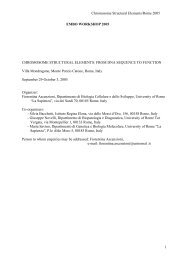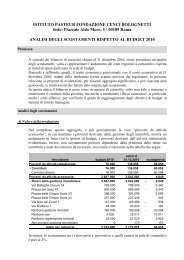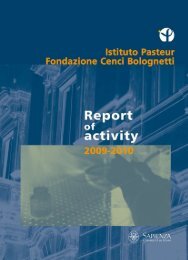download report - Istituto Pasteur
download report - Istituto Pasteur
download report - Istituto Pasteur
You also want an ePaper? Increase the reach of your titles
YUMPU automatically turns print PDFs into web optimized ePapers that Google loves.
E. Piccolella - Analysis of the molecular mechanisms regulating FOXP3 gene<br />
in the presence and absence of CsA (Panel D). CsA<br />
induced a slight decrease of FOXP3 recruitment on<br />
Il-2 promoter suggesting that, although CD28 signaling<br />
regulates FOXP3 expression in a CsA resistant<br />
manner, signals from calcineurin may have a role<br />
in this system.<br />
Finally, we have analyzed whether CD28-mediated<br />
activation of FOXP3 and its recruitment on CD25,<br />
Il-2 and CTLA4 promoters converted a small subpopulation<br />
of CD4 + CD25 - T cells to CD4 + CD25 +<br />
T cells and acquired an anergic phenotype. Indeed in<br />
these cells T cell proliferation and IL-2 synthesis<br />
were impaired. However, we present evidence that<br />
this unresponsiveness was not maintained in the<br />
absence of FOXP3, and T cell proliferation could be<br />
easily reconstituted upon subsequent exposures to<br />
antigen. This suggests that the induction of FOXP3,<br />
at least in a small number of CD4 + CD25 - T cells<br />
committed to express FOXP3, in the absence of<br />
TCR signalling, represents a new mechanism by<br />
which FOXP3 can mediate a transient shut down of<br />
TCR pathways. We have also shown that the delivery<br />
of CD28 signal in CD4 + CD25 - T cells led to<br />
propensity to apoptosis. However, the evidence that<br />
Fig. 1 - CD4 + CD25 - T cells were stimulated with anti-CD28 for<br />
24 and 48 hours. Western blottings for the presence of FOXP3<br />
were performed on Cytoplasmic (C) and nuclear (N) extracts. Antitubulin<br />
and anti-PCNA were used as loading control.<br />
100<br />
exogenous IL-2 rescued CD4 + CD25 + T cells from<br />
apoptosis but did not affect the decrease of FOXP3<br />
and CD25, supports the view that FOXP3-driven<br />
enhancement of CD25 is important for T cells survival.<br />
In conclusion, we have not only confirmed in humans<br />
that CD28 provides an unique signal to promote<br />
FOXP3 expression necessary to convert human<br />
CD4 + CD25 - T cells to CD4 + CD25 + T cells, but we<br />
went on demonstrating that FOXP3 upregulation<br />
occurred independently of TCR. This suggests a<br />
scenario where the expression of B7 on professional<br />
antigen presenting cells may contribute significantly<br />
to the homeostasis of CD4 + CD25 - T cells expressing<br />
or committed to acquire FOXP3 and to induce in<br />
these cells a transient nonresponsiveness important<br />
for the maintenance of peripheral tolerance.<br />
Selected publications<br />
Scottà C, Soligo M, Camperio C, Piccolella E.<br />
FOXP3 induced by CD28/B7 interaction regulates<br />
CD25 and anergic phenotype in human CD4 + CD25 -<br />
T lymphocytes. J Immunol. 2008, 181:1025-33.<br />
Fig. 2 - CD4 + CD25 - T cells were stimulated with adherent<br />
Dap3/B7 cells for different times. ChIP assays were performed by<br />
using anti-FOXP3 antibody or no antibody. Immunoprecipitated<br />
DNA was analyzed by PCR with CD25 (A), CTLA-4 (B) and IL-2 (C)<br />
promoter-specific primers. (D) CD4 + CD25 - T cells were activated<br />
for 24 h with anti-CD28 and treated or not with CsA.








